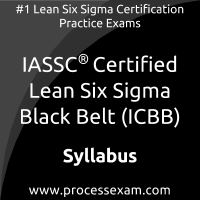
To achieve the professional designation of IASSC Certified Lean Six Sigma Black Belt from the IASSC, candidates must clear the ICBB Exam with the minimum cut-off score. For those who wish to pass the IASSC ICBB certification exam with good percentage, please take a look at the following reference document detailing what should be included in IASSC Lean Six Sigma Black Belt Exam preparation.
The IASSC ICBB Exam Summary, Body of Knowledge (BOK), Sample Question Bank and Practice Exam provide the basis for the real IASSC Certified Lean Six Sigma Black Belt (ICBB) exam. We have designed these resources to help you get ready to take IASSC Certified Lean Six Sigma Black Belt (ICBB) exam. If you have made the decision to become a certified professional, we suggest you take authorized training and prepare with our online premium IASSC Lean Six Sigma Black Belt Practice Exam to achieve the best result.
IASSC ICBB Exam Summary:
| Exam Name | IASSC Certified Lean Six Sigma Black Belt |
| Exam Code | ICBB |
| Exam Fee | USD $450 |
| Exam Duration | 240 Minutes |
| Number of Questions | 150 |
| Passing Score | 70% |
| Format | Multiple Choice |
| Schedule Exam | Book Your Exam |
| Sample Questions | IASSC ICBB Exam Sample Questions and Answers |
| Practice Exam | IASSC Certified Lean Six Sigma Black Belt (ICBB) Practice Test |
IASSC ICBB Body of Knowledge:
Define Phase |
|
| The Basics of Six Sigma |
- Meanings of Six Sigma - General History of Six Sigma & Continuous Improvement - Deliverables of a Lean Six Sigma Project - The Problem Solving Strategy Y = f(x) - Voice of the Customer, Business and Employee - Six Sigma Roles & Responsibilities |
| The Fundamentals of Six Sigma |
- Defining a Process - Critical to Quality Characteristics (CTQ’s) - Cost of Poor Quality (COPQ) - Pareto Analysis (80:20 rule) - Basic Six Sigma Metrics a. including DPU, DPMO, FTY, RTY Cycle Time; deriving these metrics |
| Selecting Lean Six Sigma Projects |
- Building a Business Case & Project Charter - Developing Project Metrics - Financial Evaluation & Benefits Capture |
| The Lean Enterprise |
- Understanding Lean - The History of Lean - Lean & Six Sigma - The Seven Elements of Waste a. Overproduction, Correction, Inventory, Motion, Overprocessing, Conveyance, Waiting. - 5S a. Sort, Straighten, Shine, Standardize, Self-Discipline |
Measure Phase |
|
| Process Definition |
- Cause & Effect / Fishbone Diagrams - Process Mapping, SIPOC, Value Stream Map - X-Y Diagram - Failure Modes & Effects Analysis (FMEA) |
| Six Sigma Statistics |
- Basic Statistics - Descriptive Statistics - Normal Distributions & Normality - Graphical Analysis |
| Measurement System Analysis |
- Precision & Accuracy - Bias, Linearity & Stability - Gage Repeatability & Reproducibility - Variable & Attribute MSA |
| Process Capability |
- Capability Analysis - Concept of Stability - Attribute & Discrete Capability - Monitoring Techniques |
Analyze Phase |
|
| Patterns of Variation |
- Multi-Vari Analysis - Classes of Distributions |
| Inferential Statistics |
- Understanding Inference - Sampling Techniques & Uses - Central Limit Theorem |
| Hypothesis Testing |
- General Concepts & Goals of Hypothesis Testing - Significance; Practical vs. Statistical - Risk; Alpha & Beta - Types of Hypothesis Test |
| Hypothesis Testing with Normal Data |
- 1 & 2 sample t-tests - 1 sample variance - One Way ANOVA a. Including Tests of Equal Variance, Normality Testing and Sample Size calculation, performing tests and interpreting results. |
| Hypothesis Testing with Non-Normal Data |
- Mann-Whitney - Kruskal-Wallis - Mood’s Median - Friedman - 1 Sample Sign - 1 Sample Wilcoxon - One and Two Sample Proportion - Chi-Squared (Contingency Tables) a. Including Tests of Equal Variance, Normality Testing and Sample Size calculation, performing tests and interpreting results. |
Improve Phase |
|
| Simple Linear Regression |
- Correlation - Regression Equations - Residuals Analysis |
| Multiple Regression Analysis |
- Non- Linear Regression - Multiple Linear Regression - Confidence & Prediction Intervals - Residuals Analysis - Data Transformation, Box Cox |
| Designed Experiments |
- Experiment Objectives - Experimental Methods - Experiment Design Considerations |
| Full Factorial Experiments |
- 2k Full Factorial Designs - Linear & Quadratic Mathematical Models - Balanced & Orthogonal Designs - Fit, Diagnose Model and Center Points |
| Fractional Factorial Experiments |
- Designs - Confounding Effects - Experimental Resolution |
Control Phase |
|
| Lean Controls |
- Control Methods for 5S - Kanban - Poka-Yoke (Mistake Proofing) |
| Statistical Process Control (SPC) |
- Data Collection for SPC - I-MR Chart - Xbar-R Chart - U Chart - P Chart - NP Chart - Xbar-S chart - CuSum Chart - EWMA Chart - Control Methods - Control Chart Anatomy - Subgroups, Impact of Variation, Frequency of Sampling - Center Line & Control Limit Calculations |
| Six Sigma Control Plans |
- Cost Benefit Analysis - Elements of the Control Plan - Elements of the Response Plan |
Both IASSC and veterans who’ve earned multiple certifications maintain that the best preparation for a IASSC ICBB professional certification exam is practical experience, hands-on training and practice exam. This is the most effective way to gain in-depth understanding of IASSC Lean Six Sigma Black Belt concepts. When you understand techniques, it helps you retain IASSC Lean Six Sigma Black Belt knowledge and recall that when needed.
